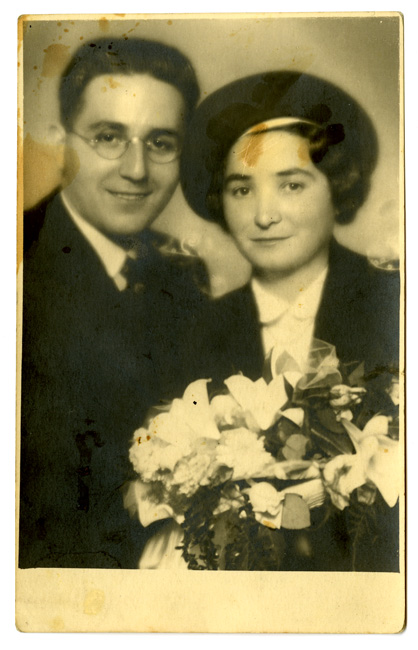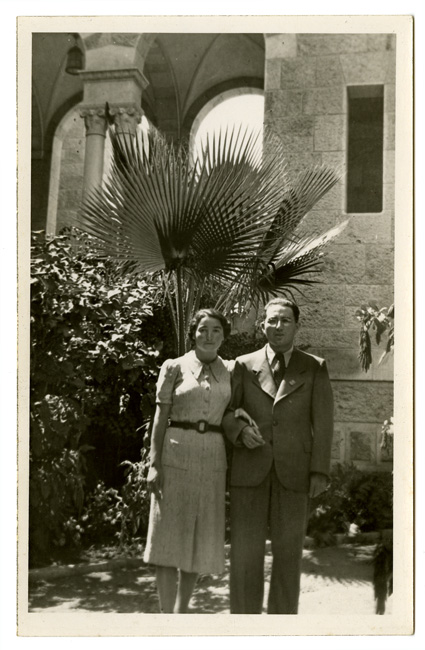Regina Halbrecht Berman was born in 1915 in Monasterzyska, in a shtetl in Galicia under control of the Austrian Empire. Less is known about Regina’s early childhood, but by the age of 20 years old she was enrolled as a student at the University of Vienna. From that time, Regina’s life became entangled with the world-historical events of Nazi Germany’s expansion. Like Jews across Europe, Regina struggled against a massive bureaucracy to save herself and her family from the Holocaust – and, against the odds, she succeeded.

On June 7, 1938, Regina married Walter Berman. Both were 23 years old. Walter had grown up in Vienna, where he studied at the Chajes Realgymnasium and then at the University of Vienna. In March and April of that year, the Austrian government submitted to annexation by Nazi Germany in a violent series of events known as the Anschluss. Many Austrians welcomed Nazi Germany and enthusiastically participated in the Nazification of the country, including the persecution of Austrian Jews. At the time of the Anschluss, Regina and Walter were living in Graz, the second largest city in Austria. Despite enrolling in classes for the spring semester, both Regina and Walter were forced to end their education at the University of Vienna early because of new decrees against Jewish university students. In Graz, Walter taught at a primary school for Jewish children. The school was established by the Jewish community in response to Austrian laws that prevented Jewish students from attending regular schools.

Later that year, on November 9 and 10, German stormtroopers and civilians carried out coordinated attacks against Jewish businesses, synagogues, homes, and community leaders throughout the German territories. Regina’s husband Walter was an eyewitness to the burning of the synagogue in Graz, and he was among the thirty thousand Jewish men arrested during the pogrom, which came to be called Kristallnacht. Like many of them, Walter was transported from a local Graz jail to Dachau concentration camp in southern Germany. Kristallnacht marked the first instance in which Nazi Germany imprisoned Jews on a massive scale based only on their ethnicity. Hundreds of these men died in Dachau and other early concentration camps like Sachsenhausen and Buchenwald as a result of abuse and maltreatment. While there, Walter sent a postcard to Regina, who had fled from Graz to Walter’s parents in Vienna.

Dearest Regi, dearest parents: [I am] sending you from here the best wishes. [I] am healthy and feeling well. They have a cafeteria here where one can spend 15 Rm per week. For cash remittances indicate on the post office section intended for me full name, date of birth, block and room. How are you d[ear] child? How are all the relatives? Regards to Uncle Abbe, Pinkas and Elli Bier. Send me your exact address as I do not know where you currently are. Regards to Mr. Lichtenstein. What are you doing the whole time? Remain healthy and write. Best wishes and kisses Walter.
Although mail was censored by the camp administration, Walter managed to hide coded messages within the correspondence. The reference to Uncle Abbe, who lived in the United States, was meant to suggest that Regina should start looking into emigration papers; most men arrested on Kristallnacht were eventually released from concentration camps on the condition that they emigrate from Germany and German-controlled territories like Austria. Relatives seeking exit visas were forced to stand in long lines in front of municipal and state offices and were required to submit to high fees and confiscation of property. SS officer Adolf Eichmann established the Central Office for Jewish Emigration in Vienna that year.
Regina immediately applied for passports for herself and her husband, which she received on November 24, 1938 and December 9, 1938. She was able to arrange a student visa for Walter to study at Hebrew University in the British Mandate of Palestine. He was released from Dachau and left Austria as a condition of release. By early February of 1939, he had arrived in Cyprus, the British-controlled island that was a common port of call on voyages to Palestine. From Cyprus, Walter wrote to Regina in Vienna:
Dearest Regi, today is Sunday and we dropped anchor offshore in Cyprus. Boats bring animals for Palestine. It is a lovely sight. Sorry you cannot experience it yourself. Kisses and regards. Walter
His letter of enrollment was issued by Hebrew University on March 15, 1939. In Palestine, Walter worked to bring Regina; she arrived on a student visa in June 1939, and they came to the United States in November 1939 on affidavits signed by Regina’s brother-in-law. Regina and Walter settled in Brooklyn, New York. With a loan from the American Jewish Joint Distribution Committee, they worked for the next several years to secure immigration papers for Walter’s parents, who eventually managed to escape the Holocaust as well.
